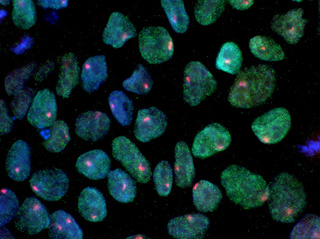
Induced pluripotent stem cells (iPSCs) derived from skin cells. The regions shown in green are proteins found in iPSCs but not found in skin cells. The red dots show the inactivated X chromosome in each cell. These cells can develop into a variety of possible cell types. See Lecture Summary 3 for more information on iPSCs. (Image by Kathrin Plath lab, University of California, Los Angeles, via CIRM, NIGMS.)
Instructor(s)
Dr. Eric Williams
Dr. Vidya Subramanian
MIT Course Number
7.347
As Taught In
Spring 2014
Level
Undergraduate
Course Description
Course Features
Course Description
During development a single totipotent cell gives rise to the vast array of cell types present in the adult human body, yet each cell has essentially the same DNA sequence. As cells differentiate, distinct sets of genes must be coordinately activated and repressed, ultimately leading to a cell-type specific pattern of gene expression and a particular cell fate. In eukaryotic organisms, DNA is packaged in a complex protein super structure known as chromatin. Modification and reorganization of chromatin play a critical role in coordinating the cell-type specific gene expression programs that are required as a cell transitions from a pluripotent stem cell to a fully differentiated cell type. Epigenetics refers to such heritable changes that occur in chromatin without altering the primary DNA sequence. This class will focus on the role of epigenetic regulation with respect to developmental fate and also consider the fact that the epigenetic mechanisms discussed have broad implications, including how seemingly normal cells can be transformed into cancerous cells.
This course is one of many Advanced Undergraduate Seminars offered by the Biology Department at MIT. These seminars are tailored for students with an interest in using primary research literature to discuss and learn about current biological research in a highly interactive setting. Many instructors of the Advanced Undergraduate Seminars are postdoctoral scientists with a strong interest in teaching.


